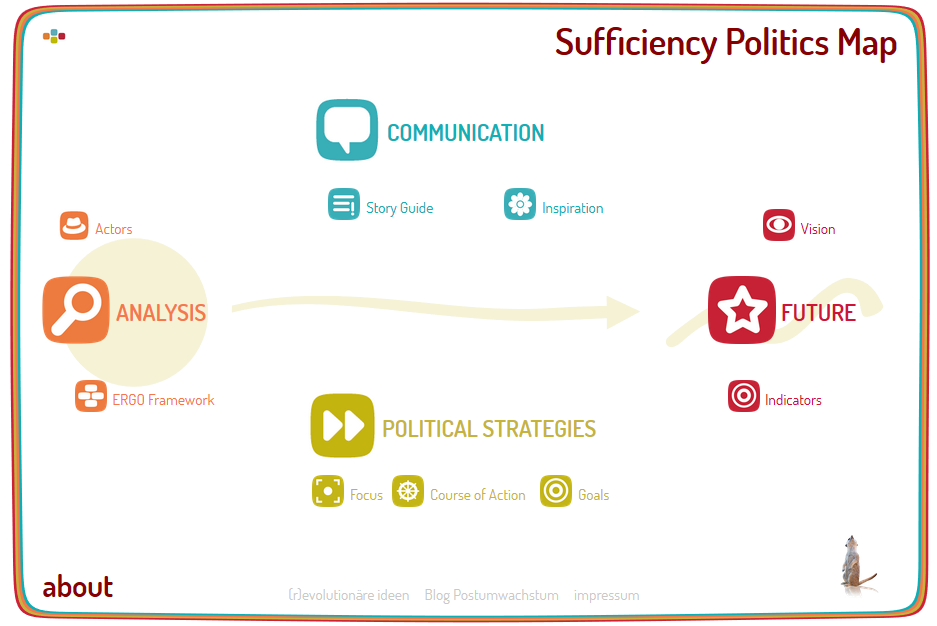Digitalization is changing the world. And it's true: The vehicles of digitalization have spread through society at a rapid pace. Smartphones only entered the market a good ten years ago! Moreover, everywhere else in society - in companies, administrations, in agriculture, in transport and even in art and music - sensors, processors and many other digital devices are introduced. Yes, it is fair to say that digitalization is changing the world.
However, it is not like any other technology that flows across the world. It is not just supposed to change the world, it's supposed to improve it. At least that is how it is portrayed by the Silicon Valley and alike. Companies from all over the world have jumped on this discourse, as have governments and much of the media coverage.
Hence it is no wonder that digitalization is associated with another hope: to save the planet. For years, there has been an expectation that ecological problems will be solved by increasing efficiency, i.e. consuming less energy and resources per product. Digitalization is said to achieve this goal. It has thus become a central instrument for coping with ecological problems - at least in words and on paper (for example here or here).
Of course, companies, governments, ministries and the media do not see it as a way to fundamentally change capitalism or even to overcome it (see here). No, digital technologies are supposed to be integrated into the existing system. Therefore, the system itself changes - for example, it is accelerated - but it does not change fundamentally.
Nevertheless, there is hope in many places: can digitalization make our economy environmentally sustainable? Can this take place within the capitalist economic system? In other words: Is digitalization the hoped-for tool to move from the old brown capitalism to a new green capitalism?
Green Capitalism
Green capitalism is an attempt to move away from fossil exploitation and towards a sustainable economy without questioning the basic principles of capitalism. According to
Hendrik Sander, the central concern of green capitalism is "to concentrate all social energies on the goal of a profound ecological reconstruction" and to become a hegemonic project. A Green New Deal – as the New Deal once was – is intended to begin a new era that can stop climate change and use market mechanisms to implement an environmental transformation.
The idea is explicitly not to question the fundamental logics of capitalism. There are two main reasons for this. Some argue that the dynamics and "creative destruction" of capitalism can be used for the green cause. After all, what other system could create new green infrastructures and establish sustainable patterns of production and consumption? In other words: Capitalism is to be put on the green track. The second reason for adhering to the capitalist system is that we do not have time to overcome it. With climate change there are only a few years, at most decades - you cannot quickly overcome capitalism in the same time. Let us take a closer look whether this is feasible in the field of mobility.
The alternative to the private car: car-sharing or bus and train?
Silicon Valley companies work on of designing the mobility of the future as an IT service and thus challenge the traditional automobile industry. Their vision is a "smart" traffic that is controlled by data and algorithms. Platform capitalistic business models around free services and the collection of user data are to replace the use of fossil fuels and the "stupid", non-networked traffic. They promise us a smart future: the solution of ecological problems with the help of algorithms and technology, without any fundamental social change – a common characteristic of Californian ideology. Combining vast amounts of venture capital with the mechanisms of a free market is supposed to bring about solutions.
Platforms of this new transport paradigm are also pushing their way onto the market in Germany: the private travel agency Uber, the recently merged taxi agency app MyTaxi, the car-sharing platform ShareNow (both run by car manufacturers Daimler and BMW) and platforms for car rental between private individuals like Tamyca and Drivy. Common to all of them is that access to a service replaces ownership of a product. However, these have little to do with an "economy of sharing" or "collaborative economy" - they are simply
new forms of profit-maximizing companies.
However, there is still no sign of a decline in the environmental impact of the flood of automobiles on Europe's cities.
On the contrary: journeys with these new fleets, especially point-to-point car-sharing offers, are more likely to replace journeys by public transport than to have a detectable effect on the purchase and operation of private vehicles.
In a single press release, Uber announced that they want to make private ownership of cars superfluous. In the same breath, Uber's Chief Executive Officer
Dara Khosrowshahi also expressed his intention to replace public transport with his service: "I want to operate the bus system for a city”.
The
scientists Ulrich Brand und Markus Wissen draw a sobering conclusion about the efforts of the digital transport system: "In essence, the described marketable and technology-oriented strategies of an ecologization of automobility are an attempt to put the imperial way of life on a permanent footing through selective ecological modernization [...]". However, this is probably not only true for the digital transport system that is currently emerging, but – as we will see in the following section – for digital capitalism and its companion economic growth.
The growth logic remains the same
In the 1920s, in the midst of the global economic crisis, the American automotive industry succeeded in developing a groundbreaking invention. Not a technical one, instead a marketing one: every year a new car!
Alfred Sloan demanded that the "changes to the new model should be so new and attractive that a demand arises [...] to a certain degree of dissatisfaction with earlier [models]". The head of General Motors had thus invented dynamic obsolescence. Ultimately, this strategy of introducing products with a deliberately limited shelf life was to become a key element of the American (and global) consumer economy.
This logic continues in the digital version of capitalism. Today it is not only "every year a new car", but also "every year a new smartphone". To be more precise, frequently buying new smartphones comes on top of frequently buying new cars. Moreover, even with cars, digitalization is acting as a growth accelerator: what distinguishes current cars from versions a few years ago always has something to do with digital possibilities: parking aids, approaches to autonomous driving, exterior cameras, and so on. This also makes it increasingly difficult to repair cars, which further increases dependence on corporations.
We see the same game in other sectors: Theoretically, the smartphone could replace many other devices as a multifunctional device. Instead, people buy new Internet-capable televisions, intelligent vacuum robots, Bluetooth-compatible stereo systems, smart security systems and so on. Given these dynamics, the question is: can digital capitalism still become sustainable despite its existing focus on profit generation and thus on rising sales figures and economic growth? Let's take a look at some figures.
An ecological assessment of the digitalization to date
In the course of digitalization, there is repeated talk of the positive effects of an information-centered economy that makes more efficient use of existing natural resources. The figures tell a different story. In general, the ecological effects of digitization can be divided into three areas: First, the material basis - the amount of energy, emissions and consumption of resources attributable to digitalization. This is the easiest thing to estimate. For example, the use of information and communication technologies (ICT) now accounts for
around ten percent of global electricity consumption - and all forecasts predict that this share will increase. Secondly, there are the energy savings that can be achieved with digital tools. How much energy can be saved by use of intelligent robotics in industry, precision farming, smart traffic management and so on? Here the figures are less simple and clear. However, it seems certain that efficiency will increase. To what extent varies from sector to sector. Thirdly, the higher efficiency is used for increased consumption - i.e. economic growth - and thus releases rebound effects. One example is streaming: while video streaming becomes more energy efficient, the vast increase in hours streamed lead to ever higher energy consumption in this area.
Overall, the ecological effects of digitalization to date are difficult to measure and ultimately difficult to determine. Because digitalization is a historically unique phenomenon and cannot be separated from other current changes. However, one thing is absolutely clear: digitalization has not yet led to a reduction in CO2 emissions or resource consumption worldwide. Quite the opposite: in the age of digitalization both continue to rise. But that's not all: in order to achieve ecological goals, we would actually need to rapidly reduce our impact on the environment - and we are far from doing so in the digital age.
No end in sight
Digitalization, as it is currently taking place, does not change the basic principles of capitalism, nor the fact that the current economy is environmentally unsustainable. Maybe digital capitalism is the lesser evil from an ecological point of view. Perhaps a further spread of mass consumption and Western lifestyles across the globe using digital means is even significantly more environmentally sustainable than it would have been based on previous capitalism. However, this comparison leads in the wrong direction. Digitalization does not create a new capitalism, but rather a continuation of existing dynamics. It is also clear that this is not environmentally sustainable. Digital capitalism is therefore not an ecological alternative to the existing one either, and the search for and fight for an environmentally friendly economic system continues.
This blog article was translated from the original article published in the conference book of the Bits & Bäume Conference on Digitalization and Sustainability 2018 in Berlin “Was Bits und Bäume verbindet – Digitalisierung nachhaltig gestaltet”. The book is accessible here.


